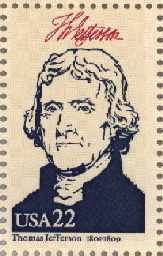
To Gideon Granger Monticello, August 13 1800SIR, -- I received with great pleasure your favor of June 4, and am much comforted by the appearance of a change of opinion in your state; for tho' we may obtain, & I believe shall obtain, a majority in the legislature of the United States, attached to the preservation of the Federal constitution according to it's obvious principles, & those on which it was known to be received; attached equally to the preservation to the states of those rights unquestionably remaining with them; friends to the freedom of religion, freedom of the press, trial by jury & to economical government; opposed to standing armies, paper systems, war, & all connection, other than commerce, with any foreign nation; in short, a majority firm in all those principles which we have espoused and the federalists have opposed uniformly; still, should the whole body of New England continue in opposition to these principles of government, either knowingly or through delusion, our government will be a very uneasy one. It can never be harmonious & solid, while so respectable a portion of it's citizens support principles which go directly to a change of the federal constitution, to sink the state governments, consolidate them into one, and to monarchize that. Our country is too large to have all its affairs directed by a single government. Public servants at such a distance, & from under the eye of their constituents, must, from the circumstance of distance, be unable to administer & overlook all the details necessary for the good government of the citizens, and the same circumstance, by rendering detection impossible to their constituents, will invite the public agents to corruption, plunder & waste. And I do verily believe, that if the principle were to prevail, of a common law being in force in the U S, (which principle possesses the general government at once of all the powers of the state governments, and reduces us to a single consolidated government,) it would become the most corrupt government on the earth. You have seen the practises by which the public servants have been able to cover their conduct, or, where that could not be done, delusions by which they have varnished it for the eye of their constituents. What an augmentation of the field for jobbing, speculating, plundering, office-building & office-hunting would be produced by an assumption of all the state powers into the hands of the general government. The true theory of our constitution is surely the wisest & best, that the states are independent as to everything within themselves, & united as to everything respecting foreign nations. Let the general government be reduced to foreign concerns only, and let our affairs be disentangled from those of all other nations, except as to commerce, which the merchants will manage the better, the more they are left free to manage for themselves, and our general government may be reduced to a very simple organization, & a very unexpensive one; a few plain duties to be performed by a few servants. But I repeat, that this simple & economical mode of government can never be secured, if the New England States continue to support the contrary system. I rejoice, therefore, in every appearance of their returning to those principles which I had always imagined to be almost innate in them. In this State, a few persons were deluded by the X. Y. Z. duperies. You saw the effect of it in our last Congressional representatives, chosen under their influence. This experiment on their credulity is now seen into, and our next representation will be as republican as it has heretofore been. On the whole, we hope, that by a part of the Union having held on to the principles of the constitution, time has been given to the states to recover from the temporary frenzy into which they had been decoyed, to rally round the constitution, & to rescue it from the destruction with which it had been threatened even at their own hands. I see copied from the American Magazine two numbers of a paper signed Don Quixotte, most excellently adapted to introduce the real truth to the minds even of the most prejudiced. I would, with great pleasure, have written the letter you desired in behalf of your friend, but there are existing circumstances which render a letter from me to that magistrate as improper as it would be unavailing. I shall be happy, on some more fortunate occasion, to prove to you my desire of serving your wishes. I sometime ago received a letter from a Mr. M'Gregory of Derby, in your State; it is written with such a degree of good sense & appearance of candor, as entitles it to an answer. Yet the writer being entirely unknown to me, and the stratagems of the times very multifarious, I have thought it best to avail myself of your friendship, & enclose the answer to you. You will see it's nature. If you find from the character of the person to whom it is addressed, that no improper use would probably be made of it, be so good as to seal & send it. Otherwise suppress it. How will the vote of your State and R I be as to A. and P.? I am, with great and sincere esteem, dear Sir, your friend and servant. |
